Exploring Stigma and Bias: Therapeutic Relationships in Healthcare
VerifiedAdded on 2023/01/19
|5
|1136
|42
Essay
AI Summary
This essay delves into the significant impacts of stigma and bias on therapeutic relationships within healthcare settings. It defines stigmatization as the negative labeling of individuals based on societal standards, highlighting its manifestation at structural, interpersonal, and intra-individual levels. The essay explores factors contributing to stigmatization, such as lack of awareness, therapeutic pessimism, inadequate skills, and workplace culture. It emphasizes the negative consequences on healthcare quality, including reduced patient willingness to seek care and the compromised ability of healthcare professionals to provide effective treatment. The author discusses the importance of communication skills and empathy in mitigating stigma. The essay concludes by advocating for the creation of therapeutic relationships that prioritize patient preferences and foster a supportive environment, ultimately ensuring ethical and competent client care.
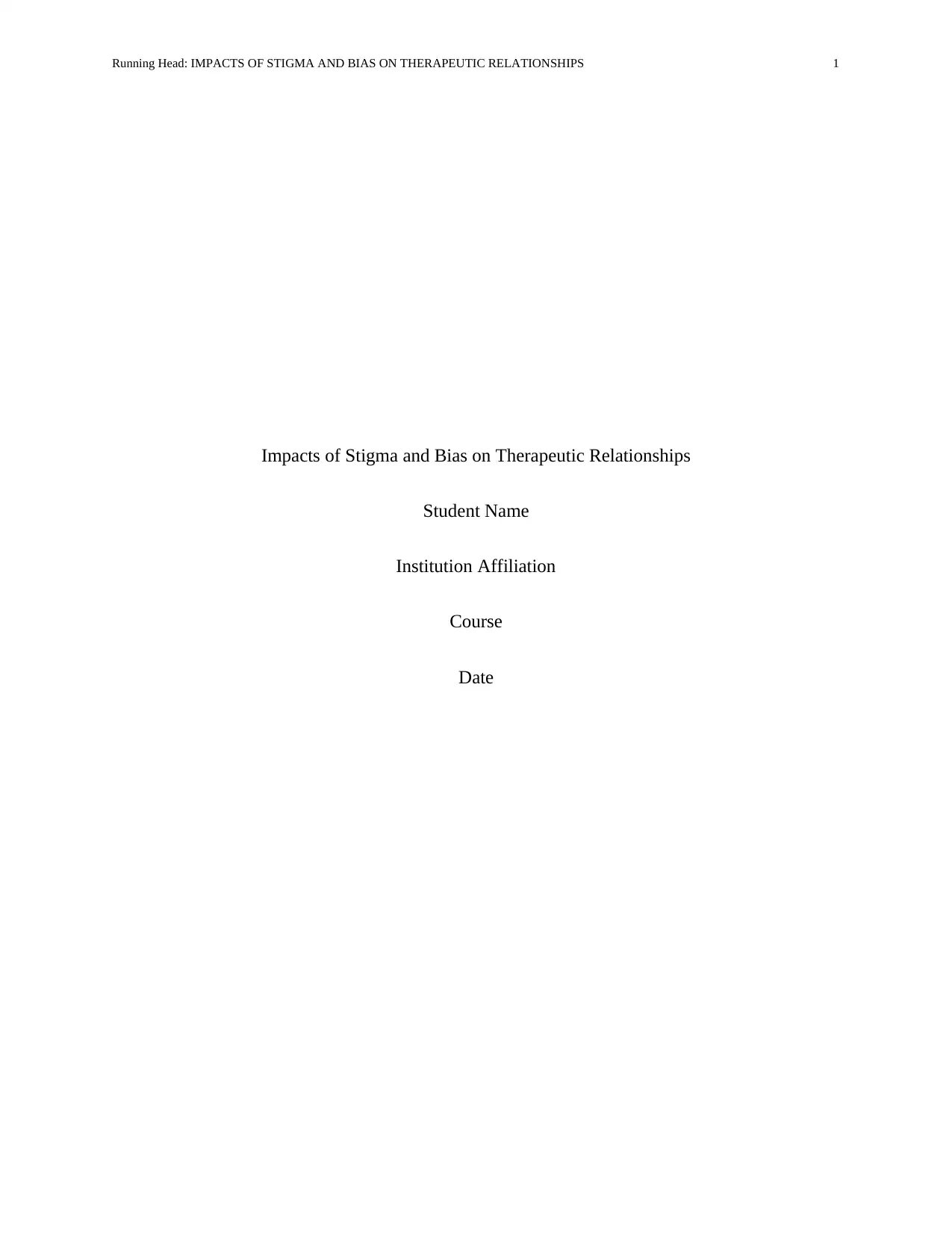
Running Head: IMPACTS OF STIGMA AND BIAS ON THERAPEUTIC RELATIONSHIPS 1
Impacts of Stigma and Bias on Therapeutic Relationships
Student Name
Institution Affiliation
Course
Date
Impacts of Stigma and Bias on Therapeutic Relationships
Student Name
Institution Affiliation
Course
Date
Paraphrase This Document
Need a fresh take? Get an instant paraphrase of this document with our AI Paraphraser
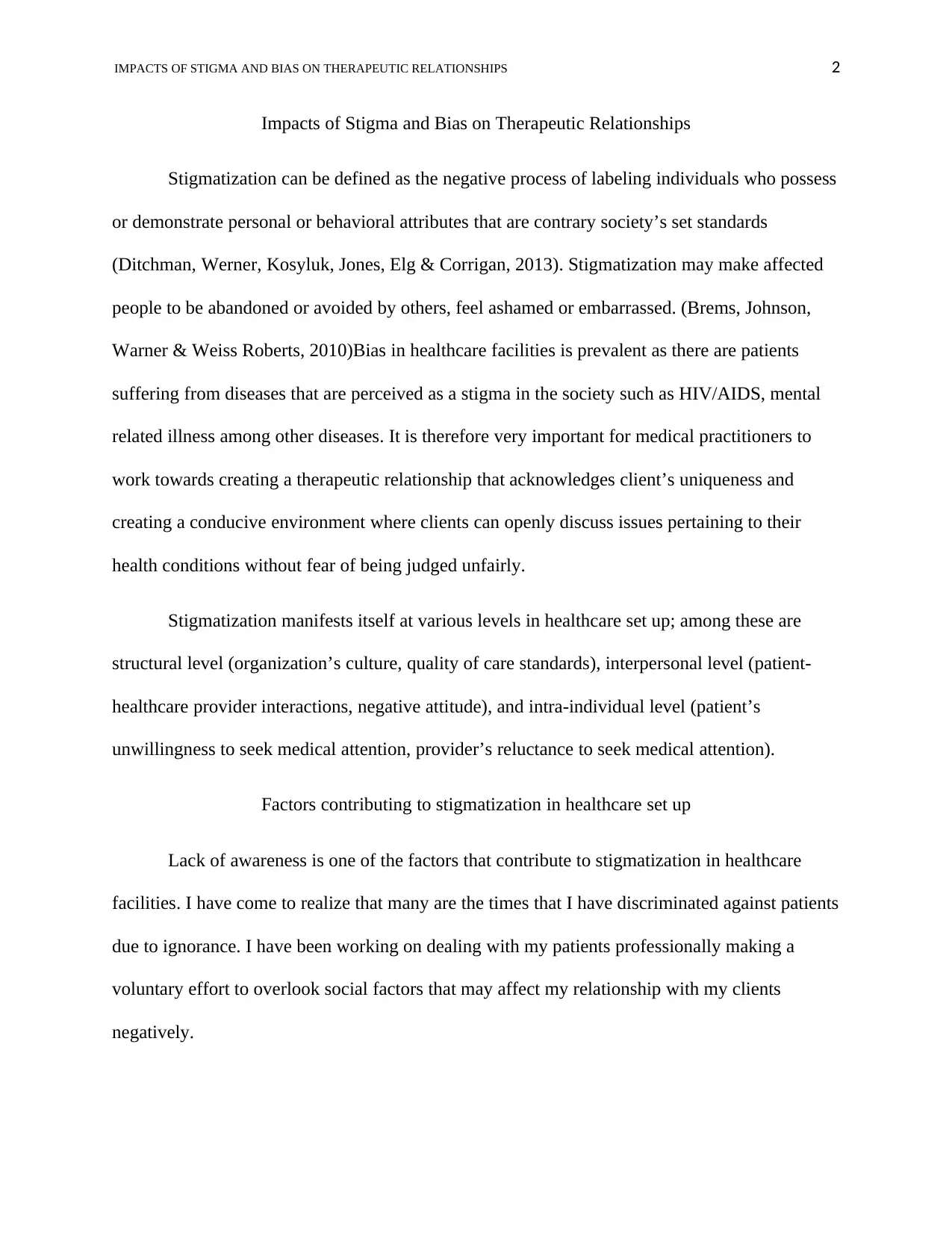
IMPACTS OF STIGMA AND BIAS ON THERAPEUTIC RELATIONSHIPS 2
Impacts of Stigma and Bias on Therapeutic Relationships
Stigmatization can be defined as the negative process of labeling individuals who possess
or demonstrate personal or behavioral attributes that are contrary society’s set standards
(Ditchman, Werner, Kosyluk, Jones, Elg & Corrigan, 2013). Stigmatization may make affected
people to be abandoned or avoided by others, feel ashamed or embarrassed. (Brems, Johnson,
Warner & Weiss Roberts, 2010)Bias in healthcare facilities is prevalent as there are patients
suffering from diseases that are perceived as a stigma in the society such as HIV/AIDS, mental
related illness among other diseases. It is therefore very important for medical practitioners to
work towards creating a therapeutic relationship that acknowledges client’s uniqueness and
creating a conducive environment where clients can openly discuss issues pertaining to their
health conditions without fear of being judged unfairly.
Stigmatization manifests itself at various levels in healthcare set up; among these are
structural level (organization’s culture, quality of care standards), interpersonal level (patient-
healthcare provider interactions, negative attitude), and intra-individual level (patient’s
unwillingness to seek medical attention, provider’s reluctance to seek medical attention).
Factors contributing to stigmatization in healthcare set up
Lack of awareness is one of the factors that contribute to stigmatization in healthcare
facilities. I have come to realize that many are the times that I have discriminated against patients
due to ignorance. I have been working on dealing with my patients professionally making a
voluntary effort to overlook social factors that may affect my relationship with my clients
negatively.
Impacts of Stigma and Bias on Therapeutic Relationships
Stigmatization can be defined as the negative process of labeling individuals who possess
or demonstrate personal or behavioral attributes that are contrary society’s set standards
(Ditchman, Werner, Kosyluk, Jones, Elg & Corrigan, 2013). Stigmatization may make affected
people to be abandoned or avoided by others, feel ashamed or embarrassed. (Brems, Johnson,
Warner & Weiss Roberts, 2010)Bias in healthcare facilities is prevalent as there are patients
suffering from diseases that are perceived as a stigma in the society such as HIV/AIDS, mental
related illness among other diseases. It is therefore very important for medical practitioners to
work towards creating a therapeutic relationship that acknowledges client’s uniqueness and
creating a conducive environment where clients can openly discuss issues pertaining to their
health conditions without fear of being judged unfairly.
Stigmatization manifests itself at various levels in healthcare set up; among these are
structural level (organization’s culture, quality of care standards), interpersonal level (patient-
healthcare provider interactions, negative attitude), and intra-individual level (patient’s
unwillingness to seek medical attention, provider’s reluctance to seek medical attention).
Factors contributing to stigmatization in healthcare set up
Lack of awareness is one of the factors that contribute to stigmatization in healthcare
facilities. I have come to realize that many are the times that I have discriminated against patients
due to ignorance. I have been working on dealing with my patients professionally making a
voluntary effort to overlook social factors that may affect my relationship with my clients
negatively.
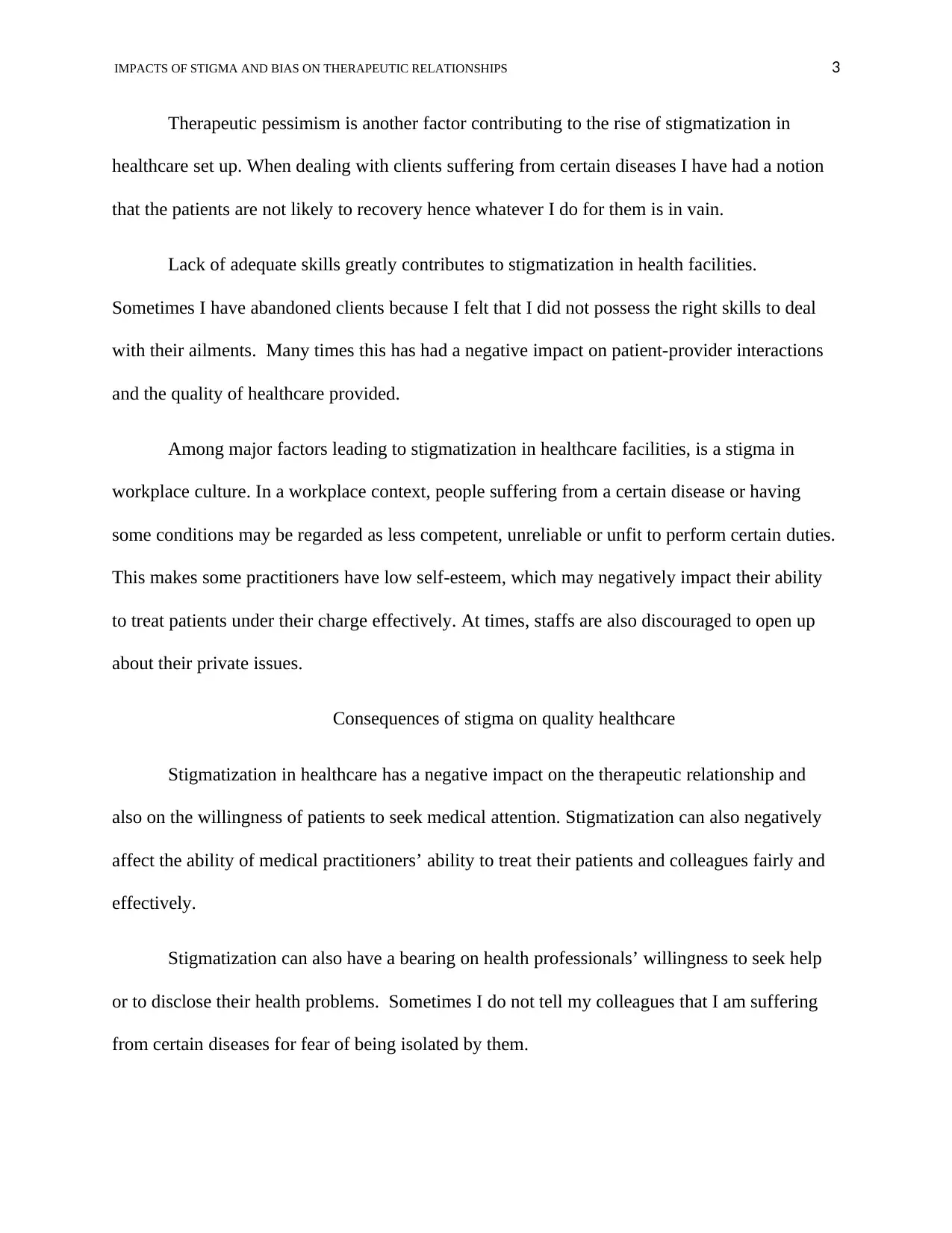
IMPACTS OF STIGMA AND BIAS ON THERAPEUTIC RELATIONSHIPS 3
Therapeutic pessimism is another factor contributing to the rise of stigmatization in
healthcare set up. When dealing with clients suffering from certain diseases I have had a notion
that the patients are not likely to recovery hence whatever I do for them is in vain.
Lack of adequate skills greatly contributes to stigmatization in health facilities.
Sometimes I have abandoned clients because I felt that I did not possess the right skills to deal
with their ailments. Many times this has had a negative impact on patient-provider interactions
and the quality of healthcare provided.
Among major factors leading to stigmatization in healthcare facilities, is a stigma in
workplace culture. In a workplace context, people suffering from a certain disease or having
some conditions may be regarded as less competent, unreliable or unfit to perform certain duties.
This makes some practitioners have low self-esteem, which may negatively impact their ability
to treat patients under their charge effectively. At times, staffs are also discouraged to open up
about their private issues.
Consequences of stigma on quality healthcare
Stigmatization in healthcare has a negative impact on the therapeutic relationship and
also on the willingness of patients to seek medical attention. Stigmatization can also negatively
affect the ability of medical practitioners’ ability to treat their patients and colleagues fairly and
effectively.
Stigmatization can also have a bearing on health professionals’ willingness to seek help
or to disclose their health problems. Sometimes I do not tell my colleagues that I am suffering
from certain diseases for fear of being isolated by them.
Therapeutic pessimism is another factor contributing to the rise of stigmatization in
healthcare set up. When dealing with clients suffering from certain diseases I have had a notion
that the patients are not likely to recovery hence whatever I do for them is in vain.
Lack of adequate skills greatly contributes to stigmatization in health facilities.
Sometimes I have abandoned clients because I felt that I did not possess the right skills to deal
with their ailments. Many times this has had a negative impact on patient-provider interactions
and the quality of healthcare provided.
Among major factors leading to stigmatization in healthcare facilities, is a stigma in
workplace culture. In a workplace context, people suffering from a certain disease or having
some conditions may be regarded as less competent, unreliable or unfit to perform certain duties.
This makes some practitioners have low self-esteem, which may negatively impact their ability
to treat patients under their charge effectively. At times, staffs are also discouraged to open up
about their private issues.
Consequences of stigma on quality healthcare
Stigmatization in healthcare has a negative impact on the therapeutic relationship and
also on the willingness of patients to seek medical attention. Stigmatization can also negatively
affect the ability of medical practitioners’ ability to treat their patients and colleagues fairly and
effectively.
Stigmatization can also have a bearing on health professionals’ willingness to seek help
or to disclose their health problems. Sometimes I do not tell my colleagues that I am suffering
from certain diseases for fear of being isolated by them.
⊘ This is a preview!⊘
Do you want full access?
Subscribe today to unlock all pages.

Trusted by 1+ million students worldwide
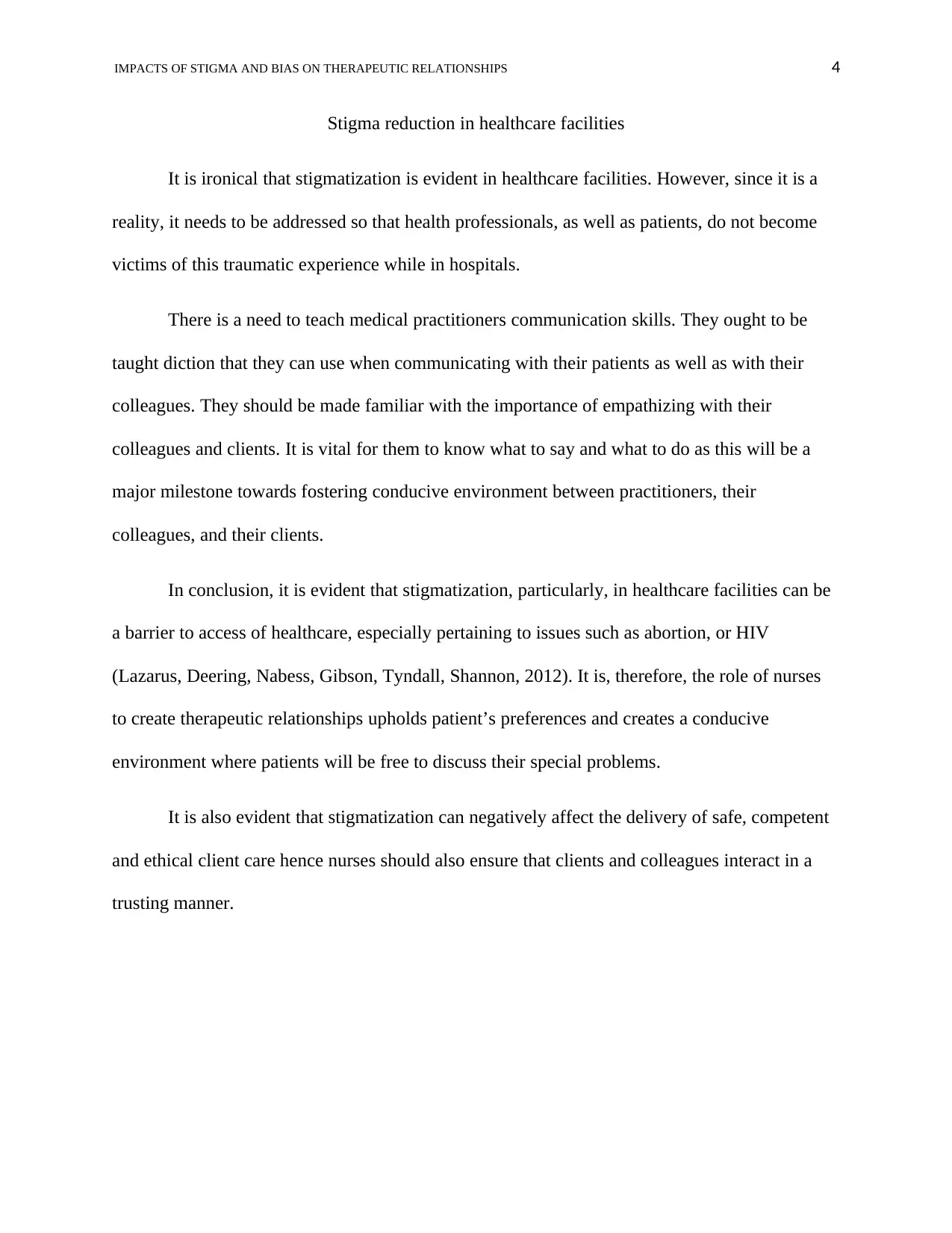
IMPACTS OF STIGMA AND BIAS ON THERAPEUTIC RELATIONSHIPS 4
Stigma reduction in healthcare facilities
It is ironical that stigmatization is evident in healthcare facilities. However, since it is a
reality, it needs to be addressed so that health professionals, as well as patients, do not become
victims of this traumatic experience while in hospitals.
There is a need to teach medical practitioners communication skills. They ought to be
taught diction that they can use when communicating with their patients as well as with their
colleagues. They should be made familiar with the importance of empathizing with their
colleagues and clients. It is vital for them to know what to say and what to do as this will be a
major milestone towards fostering conducive environment between practitioners, their
colleagues, and their clients.
In conclusion, it is evident that stigmatization, particularly, in healthcare facilities can be
a barrier to access of healthcare, especially pertaining to issues such as abortion, or HIV
(Lazarus, Deering, Nabess, Gibson, Tyndall, Shannon, 2012). It is, therefore, the role of nurses
to create therapeutic relationships upholds patient’s preferences and creates a conducive
environment where patients will be free to discuss their special problems.
It is also evident that stigmatization can negatively affect the delivery of safe, competent
and ethical client care hence nurses should also ensure that clients and colleagues interact in a
trusting manner.
Stigma reduction in healthcare facilities
It is ironical that stigmatization is evident in healthcare facilities. However, since it is a
reality, it needs to be addressed so that health professionals, as well as patients, do not become
victims of this traumatic experience while in hospitals.
There is a need to teach medical practitioners communication skills. They ought to be
taught diction that they can use when communicating with their patients as well as with their
colleagues. They should be made familiar with the importance of empathizing with their
colleagues and clients. It is vital for them to know what to say and what to do as this will be a
major milestone towards fostering conducive environment between practitioners, their
colleagues, and their clients.
In conclusion, it is evident that stigmatization, particularly, in healthcare facilities can be
a barrier to access of healthcare, especially pertaining to issues such as abortion, or HIV
(Lazarus, Deering, Nabess, Gibson, Tyndall, Shannon, 2012). It is, therefore, the role of nurses
to create therapeutic relationships upholds patient’s preferences and creates a conducive
environment where patients will be free to discuss their special problems.
It is also evident that stigmatization can negatively affect the delivery of safe, competent
and ethical client care hence nurses should also ensure that clients and colleagues interact in a
trusting manner.
Paraphrase This Document
Need a fresh take? Get an instant paraphrase of this document with our AI Paraphraser
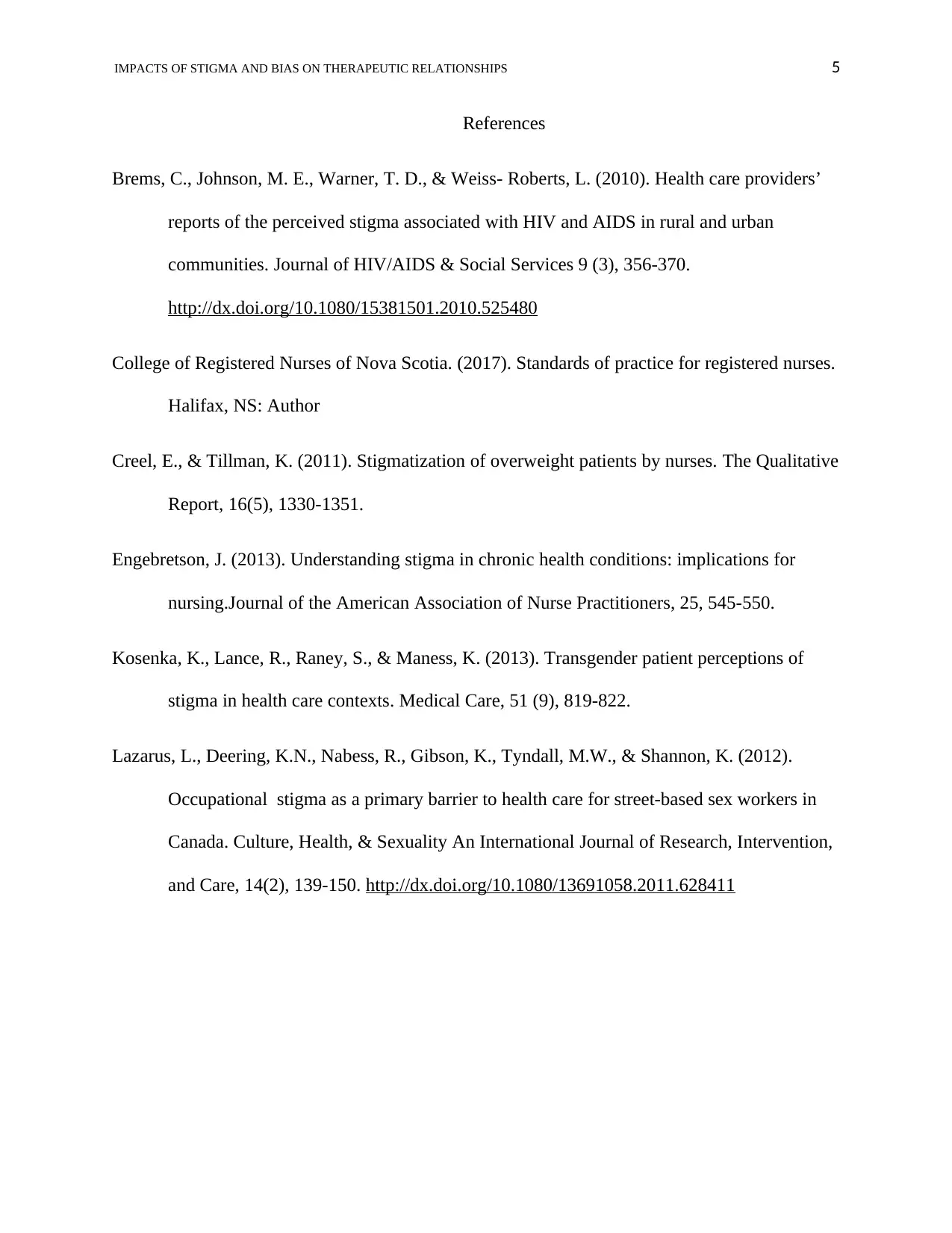
IMPACTS OF STIGMA AND BIAS ON THERAPEUTIC RELATIONSHIPS 5
References
Brems, C., Johnson, M. E., Warner, T. D., & Weiss- Roberts, L. (2010). Health care providers’
reports of the perceived stigma associated with HIV and AIDS in rural and urban
communities. Journal of HIV/AIDS & Social Services 9 (3), 356-370.
http://dx.doi.org/10.1080/15381501.2010.525480
College of Registered Nurses of Nova Scotia. (2017). Standards of practice for registered nurses.
Halifax, NS: Author
Creel, E., & Tillman, K. (2011). Stigmatization of overweight patients by nurses. The Qualitative
Report, 16(5), 1330-1351.
Engebretson, J. (2013). Understanding stigma in chronic health conditions: implications for
nursing.Journal of the American Association of Nurse Practitioners, 25, 545-550.
Kosenka, K., Lance, R., Raney, S., & Maness, K. (2013). Transgender patient perceptions of
stigma in health care contexts. Medical Care, 51 (9), 819-822.
Lazarus, L., Deering, K.N., Nabess, R., Gibson, K., Tyndall, M.W., & Shannon, K. (2012).
Occupational stigma as a primary barrier to health care for street-based sex workers in
Canada. Culture, Health, & Sexuality An International Journal of Research, Intervention,
and Care, 14(2), 139-150. http://dx.doi.org/10.1080/13691058.2011.628411
References
Brems, C., Johnson, M. E., Warner, T. D., & Weiss- Roberts, L. (2010). Health care providers’
reports of the perceived stigma associated with HIV and AIDS in rural and urban
communities. Journal of HIV/AIDS & Social Services 9 (3), 356-370.
http://dx.doi.org/10.1080/15381501.2010.525480
College of Registered Nurses of Nova Scotia. (2017). Standards of practice for registered nurses.
Halifax, NS: Author
Creel, E., & Tillman, K. (2011). Stigmatization of overweight patients by nurses. The Qualitative
Report, 16(5), 1330-1351.
Engebretson, J. (2013). Understanding stigma in chronic health conditions: implications for
nursing.Journal of the American Association of Nurse Practitioners, 25, 545-550.
Kosenka, K., Lance, R., Raney, S., & Maness, K. (2013). Transgender patient perceptions of
stigma in health care contexts. Medical Care, 51 (9), 819-822.
Lazarus, L., Deering, K.N., Nabess, R., Gibson, K., Tyndall, M.W., & Shannon, K. (2012).
Occupational stigma as a primary barrier to health care for street-based sex workers in
Canada. Culture, Health, & Sexuality An International Journal of Research, Intervention,
and Care, 14(2), 139-150. http://dx.doi.org/10.1080/13691058.2011.628411
1 out of 5
Related Documents
Your All-in-One AI-Powered Toolkit for Academic Success.
+13062052269
info@desklib.com
Available 24*7 on WhatsApp / Email
![[object Object]](/_next/static/media/star-bottom.7253800d.svg)
Unlock your academic potential
Copyright © 2020–2026 A2Z Services. All Rights Reserved. Developed and managed by ZUCOL.





